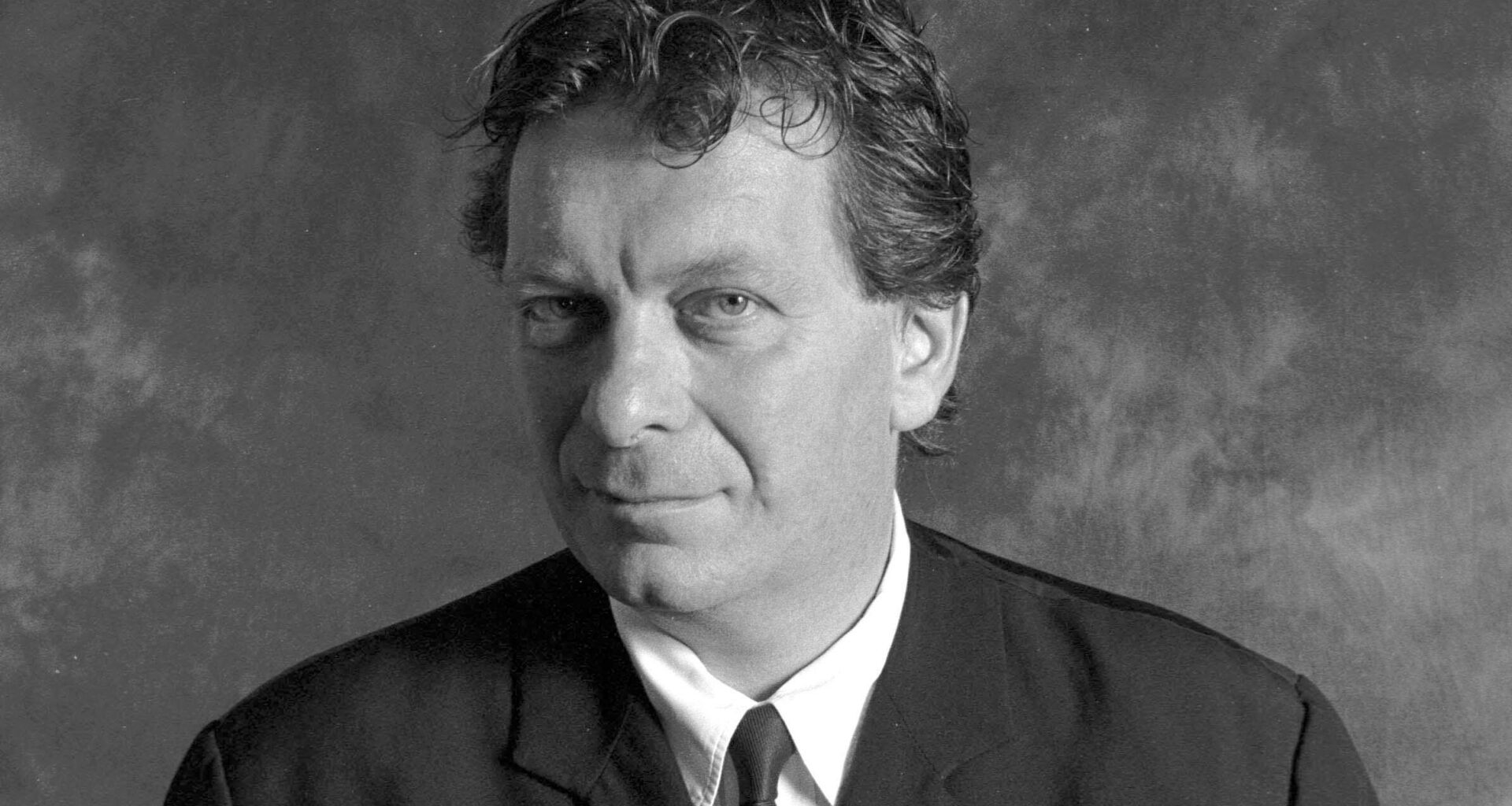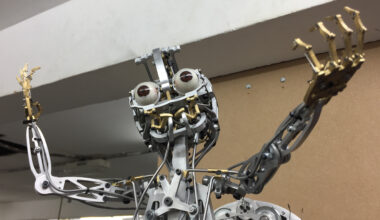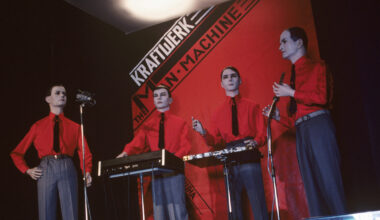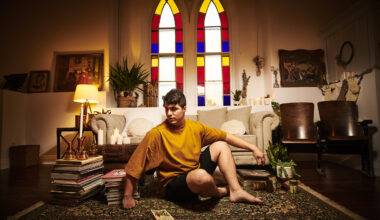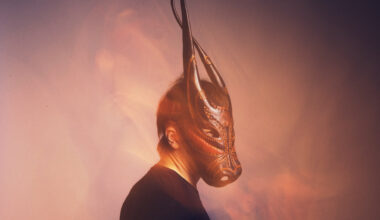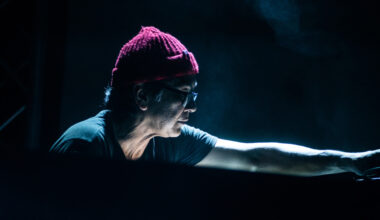In 2005, I decided to make a documentary film about the early years of Factory Records called ‘Shadowplayers’ and conducted filmed interviews with around 25 key participants. My conversation with Tony Wilson took place on Saturday 29 October 2005 at his loft apartment on Little Peter Street in Manchester (designed by Ben Kelly) and lasted about 90 minutes before Tony excused himself to watch an important football match on TV.
My recollection was that our encounter had been a little awkward, partly because Tony wasn’t particularly interested in talking about past events, and also because I stopped him drifting off on too many tangents. But in 2019, with Factory Records 40 years old, I reviewed the unedited footage while preparing the forthcoming ‘Use Hearing Protection’ boxset for Warner Music Group, and found that my no-nonsense, factual approach had worked rather well.
What follows is more or less the entire interview, only slightly edited to remove any defamation and score settling. You can also watch it on YouTube, with Tony’s mad Weimaraner dog William chasing around in the background.
Where did the name “Factory” come from?
“It was exactly as the ‘24 Hour Party People’ movie suggests. It was Alan Erasmus seeing a sign somewhere saying, ‘Factory closing’, and he thought, ‘Well, we’ll call it Factory and we’ll have a Factory opening’. So it was actually Alan’s idea completely. I mean, Alan is the great unknown figure in all this. I can remember being in a bar meeting four of the actors the night before ‘24 Hour Party People’ started filming, including the gentleman who’d just played Gollum flying in from New Zealand to play Martin Hannett, and Paddy Considine, who played Rob Gretton, and also Lennie James, who played Alan. Lennie had been in Manchester that day and had an arrangement to meet Alan and Alan hadn’t turned up. They spent 10 weeks in this town and there were five more occasions when Alan was meant to meet Lennie… he never met him. So Alan is the great unknown aesthetic quality, the spiritual background of Factory. And if anyone can ever find out what the idea was, I’d be very grateful.”
Who did the bookings at the Factory club?
“The whole thing was just Alan Erasmus and myself. The two of us opened a club for four nights. It’s as simple as that. The two of us were managers of The Durutti Column and Alan was also the manager of Fast Breeder. They were a crap group that I’d seen with him at some pub in Failsworth. I think they were called Flashback and when he began managing them they changed their name to Fast Breeder. Both names sound terrible now one looks back on it. And then when he was fired as manager and when the drummer and the guitarist were fired, Dave Rowbotham and Chris Joyce, that was the day I joined up with him to manage the remnants of that band. They became The Durutti Column with the addition of Vini Reilly…
“But our efforts to mould a band didn’t work at all because we couldn’t find the right lead singer. Most of the band wanted to use a producer called Laurie Latham, but me and Alan wanted to use Martin Hannett. We fell out and everybody except Vini left to form The Mothmen, who became Simply Red. We were left with Vini and bizarrely we had the chutzpah to say, ‘Fuck it Vini, we’re doing an album, we’ve booked a week in Cargo Studios, you go in with Martin, whatever comes out of it, we’ll see’, and obviously that’s one of the most wonderful albums.”
With the club, is it really the case that Peter Saville only delivered the posters on the first night?
“No, it’s a myth that Peter delivered the posters on the first night. Peter delivered the posters two weeks into the four-week run, so the first two nights had already happened. I think it was probably the Monday of the third week, with two Fridays to go. But it was a great poster.”
What made you choose the four acts on ‘A Factory Sample’?
“You choose the bands that are around you that you’re excited by. So we had The Durutti Column and our mate Rob Gretton had this band Joy Division. Around this time, I was asked by Roger Eagle, the legendary now-late Manchester music man who ran Eric’s in Liverpool, to go and help him restart Eric’s Records after releasing Big In Japan the year before. So I drive to Liverpool to meet Roger and Pete Fulwell. They wanted to do a sampler with four bands and I thought, ‘Nice idea, we’ve got The Durutti Column, Joy Division…’. But the problem was, a few nights before, I’d been tripping round at Chris Joyce’s house and I’d picked up a Far East copy of Santana’s ‘Abraxas’, and they’d printed the sleeve, that beautiful incredible painting that is the ‘Abraxas’ sleeve, on almost tissue paper, which was then sealed in plastic. So, off my head on hallucinogens, I was feeling this and thinking, ‘Oooh, wow wow wow’, and for whatever reason I then began to imagine how you could fold paper into plastic and seal it and make a double sleeve.
“When I got to Liverpool, I was very honoured to be asked by Roger and Pete to be their new A&R man, but they wanted to do a 12-inch sampler and I wanted to do the first double seven-inch since The Beatles’ ’Magical Mystery Tour’. And it was an irresolvable argument because they wanted a 12-inch single, I wanted a double seven-inch in this strange plastic packaging. So I drove back down the M62 and said to Alan, ‘Fuck ’em, let’s do it ourselves’. Which we did. We were friends with Cabaret Voltaire from Sheffield, who had some tracks they wanted to put out, and John Dowie, who was connected to Alberto Y Lost Trios Paranoias. So we’ve got four mates – we’ve got our own band, we’ve got Rob’s band, there’s the Cabs in Sheffield, and there’s this comedy guy we know – we’ll do a four-sided record.”
Rob Gretton seems to have been quite the opposite to you, more of an introvert. The bands seem to feel he was “one of them”, whereas perhaps you stood apart. Do you think the relationship between you and Rob worked because you were such different people, but with complementary qualities?
“I think the best description of the whole thing was the line by promoter Alan Wise, that Factory was five extremely heterosexual men, all in one way or another in love with each other. Which is a wonderful way of looking at it. And certainly my relationship with Rob was… we were the best of friends and best of enemies.
“There were times when it did come to fisticuffs. In the early days, for example, there was a band called Crawling Chaos, who were from Newcastle and they were crusties before crusties existed. They used to take the piss out of Joy Division going, ‘Oh, Joy Division, you think you’re fucking great, don’t you?’. So I would try to book Crawling Chaos for every Joy Division gig I possibly could and there was one night at the Russell Club when suddenly, there it was, it was Joy Division and Crawling Chaos supporting. And Rob came up to me in the upstairs bit, where we served curried goat and peas, and went, ‘Very funny that, Tone’. And I went, ‘I thought you’d like it Rob’. At which, Rob nutted me and, as I went down, he kneed me in the balls. So the fact that there was occasional violence was relevant.
“I look back on it, I mean, how naive was I? Well, I wasn’t naive, I loved the way it turned out, but the fact that on that very first night when Rob said, “Er, before Joy Division go to Warner Brothers, we’ll do the first album with you’… I went, ‘Are you sure? How much will that cost?’. He said, ‘Martin Hannett says it will cost 10 grand’. And that very night, for Rob to say, ‘Right, here’s the deal, it’s 50/50, but without the publishing and the publishing comes out of your half’… And obviously, I didn’t give a fuck. The fact that the deal was the most generous deal ever done in the music industry only occurs to you later. And how would some kid from Wythenshawe have that insight?
“Another story I have to tell about Gretton was when he and I did the beauty parade in Los Angeles in… I think it was 1982. It was when every major label in the world wanted to sign New Order in America, and we played on Hollywood Boulevard and every one of the big bosses was out. People said they hadn’t seen all these guys out together in the same hall for maybe five years. We went to meet everybody and had a wonderful afternoon with David Geffen, who kept his dinner date waiting in the outside office for an hour, and the dinner date was Michael Jackson. So we got to meet Michael Jackson.
“But the point of the story is that we saw Warner Brothers. In my opinion, Warners under Mo Ostin is the greatest record company in the history of music. And we sat there, me being terribly polite and Rob sort of a bit like he usually was, and there was Mo Ostin and these other big cheeses. And at the end Mo said, ‘So, um, anything else Tony?’. I’m going, ‘No, no, it’s fantastic’ and ‘Rob, anything else?’. And Gretton stirred in his seat and went, ‘Er, we’re a bit worried about your financial position’. And I’m like, ‘What?! This is Warner Brothers!’, and before I could do anything, these five, six guys jumped out of their seats, came round the table and got… I think Mo got on his knees and said, ‘We’re sorry Rob, we’re really sorry, we know we’ve fucked up’. They were apologising to Rob for the Atari disaster, which had cut the Warners share price by 50 per cent. I knew nothing about that. So there’s this supposedly untutored, unsophisticated, sort of Wythenshawe thug… but it was just a front. He was a very, very bright boy.”
Did you always agree with his A&R decisions on records after he became a director and was able to make those choices?
“For the first six months, the first year, it was me and Alan. Then for the next two or three years, it was Joy Division, it was Rob and Hooky and Ian. It was those people who were bringing in Section 25 and the rest of it. So, yes, I always agreed.”
What was it about Martin Hannett that made you want to get him involved with Factory?
“I think I only have one talent. And my talent is an obsession with people who are cleverer than I am. People think I am very arrogant, which I am, but it isn’t often that egomaniacs have a desire to hang out with people who are cleverer than they are. And I do.
“It was something in Martin’s eyes. Even though our very first meeting was hostile. I was introduced to this guy at The Forum, which is this big civic auditorium in Wythenshawe. It was a Slaughter And The Dogs gig plus Wild Ram, who were a rock band with a young Vini Reilly. A few weeks before this, my TV show ‘So It Goes’, the show that launched the Sex Pistols, had just been done over by every single newspaper in Britain. So I was reeling from 47 reviews, which were kind of mixed reviews in that they were mixed between saying ‘The show is shit’ and ‘The presenter is shit’. So I was kind of pretty vulnerable and the New Manchester Review, or whatever the local magazine was here, the writer in that had called it ‘The Six O’Clock Club’ or something rude. Anyway, someone said, ‘Martin Hannett’s here’, and I said, ‘Oh, hello Mr Hannett, pleased to meet you, did you write that piece in the New Manchester Review?’, and Martin sort of smiled and said, ‘Yes I did’, and I went, ‘Fuck you’ and walked off.
“For the rest of that night I was in the dressing room, going back and forth to the stage announcing the acts. And every half hour, a little boy would knock on the backstage door. ‘Excuse me, Mr Wilson, Mr Hannett’s out in the car park’. Because Martin is pure Manchester and I’m Salford, he expected me to go out and have a fight with him in the car park, but I just ignored it completely. But every half hour it was, ‘Mr Hannett’s in the car park’. Anyway, for whatever reason, we did become friends. I don’t know, I hope I have a facility for spotting genius. Genius is a word that’s used too often, but there is no way it’s overused for Martin. The whole of ‘24 Hour Party People’ was worth it just for the line in Empire, the movie magazine, which said… Who was the kid that played Martin Hannett in the movie? The actor who had played Gollum?”
Andy Serkis…
“Yes, Andy Serkis, the man who played Gollum in ‘The Lord Of The Rings’. Empire said, ‘At last, he gets to play someone really weird’. And it’s true. Gollum was a normal guy by comparison to Hannett.”
Did it worry you that, when ‘Unknown Pleasures’ had been recorded, although you liked it and Hannett liked it and Gretton liked it, the band didn’t. Was that a concern?
“We were clever enough at the very beginning to know that musicians know fuck all about music. They’re given the gift of writing it, but they’re attitude to it is bollocks. I think the first time I ever realised that was when Joy Division didn’t like ‘Unknown Pleasures’. Well, fuck you, I’m sorry, this is something incredibly special, so go fuck yourselves. That was an important lesson to learn. Musicians are given the godlike gift of writing music. Knowing about music is often a little beyond them.”
With the early releases by Factory, you had artists like X-O-Dus, OMD, The Distractions and Crawling Chaos. Were you taking the lead of Rabid Records and releasing a lot of diverse music and thinking you might be able to license those groups out to majors?
“No, I don’t think so. I think, again, it was merely stuff that one liked. I really liked X-O-Dus. It was Lindsay, my first wife, who insisted on playing this Orchestral Manoeuvres In The Dark tape for a second time in the car and getting me into that. But it is important to remember that everyone presumed that independent record labels were some kind of post-punk response to corporate monoliths. And they completely misunderstand the history of British culture. If you think about it, the great punk bands were all signed to majors. The first time I ever heard of The Clash, they were on CBS. Malcolm McLaren signed the Sex Pistols to every major label that was available. The Buzzcocks actually signed to United Artists the night that my colleagues and I filmed them at the Electric Circus, which was the night Elvis Presley died in 1977.
“The point was not to fight the majors, but to put a record out by your group to get them signed to the majors. And everyone was doing that. So Tosh Ryan at Rabid in Manchester had done that with John Cooper Clarke to CBS and with Jilted John to EMI. And shortly thereafter, the best indie label of all, before Factory, was Fast Product from Edinburgh. A wonderfully arty, clever label with two amazing bands – Gang Of Four and The Human League. And they signed Gang Of Four to EMI and The Human League to Virgin. The first of our bands to go was Orchestral Manoeuvres. There was a little bit of a bidding war between Virgin and Phonogram, they go to Virgin, and we’ve done our job.
“I used to do trips to London with Rob to meet Warner Brothers people and what has to be remembered in the history of British rock ’n’ roll is that the man who invented independent music was Robert Leo Gretton. That night when he said to me, ‘Why don’t we do our first album with you before we go off to Warner Brothers’, I didn’t know that Rob had a thought in his mind, which was, ‘Your mother’s money that you spent on ‘A Factory Sample’, our first record, we got back plus 200 quid, so we all got 50 quid. An album makes a lot more money than that, the parameters of pricing are so different, so we could make real money… and if it did work, I wouldn’t have to get on a train every week and go to London to talk to cunts’.
“That was Rob’s vision. He didn’t tell me that, I just thought it was an experiment. Of course, we did it with ‘Unknown Pleasures’. It began slowly, we pressed 10,000, and the first 5,000 went out to distributors and shops around the country. The other 5,000 were shoved into my garage, largely by Hooky and Joy Division’s tour manager, Terry Mason. And then when the second 5,000 sold, we began repressing. I mean, 10,000 units times £5. It’s £50,000, then it’s £60,000… suddenly, you’re in business. That was the vision Rob had and, indeed, he never had to go to London to talk to cunts again. That was what he wanted. A year later, it’s unimaginable that one would sign to a major, suddenly you’re this political revolutionary force, and everyone realises you’ve got Rough Trade, you’ve got Factory, you’ve got Mute and the rest of them.”
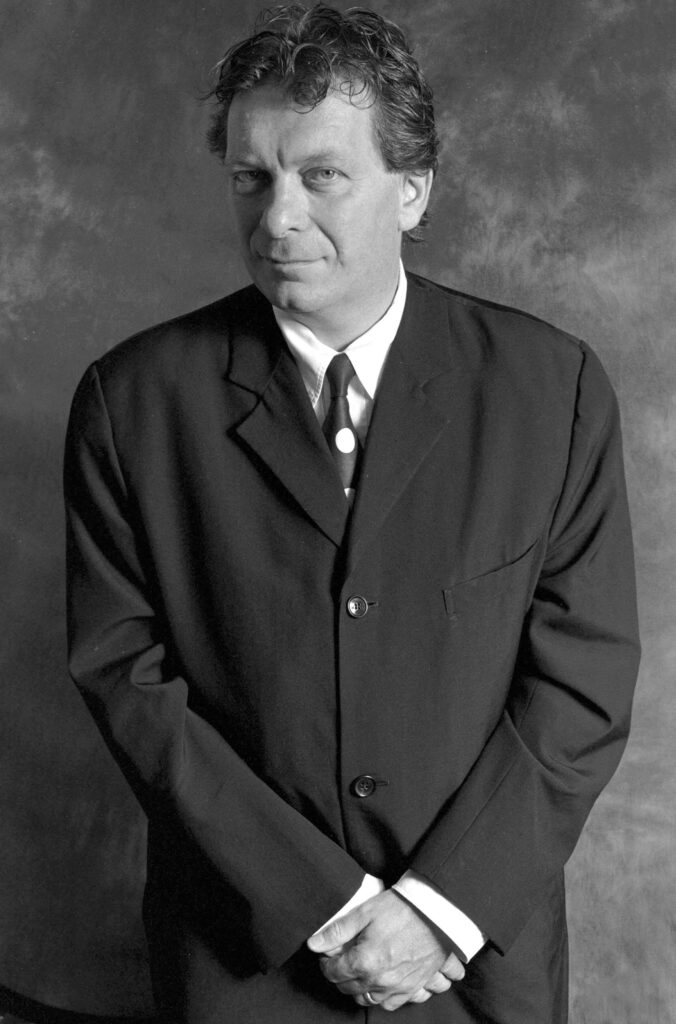
What did you see in A Certain Ratio? What caught your attention?
“A Certain Ratio were remarkable. Everyone in the music industry doesn’t really want the next Beatles. They want The Velvet Underground. We all want The Velvet Underground. I remember the very last night ACR played before Donald Johnson joined, they played the Factory club. It was half empty and they were onstage doing that grinding thing, with Simon Topping and his noise machine, and Jon Savage was sitting at one of the low tables. I remember Jon turned to look at me and I looked at him, and the look in both our eyes was, ‘My God, we have our own Velvet Underground’. They were that intense and they were that wonderful.
“I think Alan and I were very excited by our new life, but Vini Reilly would be OK for a day and then ill for two weeks. It was Rob who said, ‘There’s this other band, A Certain Ratio, have a look at them’. And we saw them and they were stunning and we thought, ‘Why not?’. So I was managing two groups and my entire life was spent trying to get Vini to stop singing and trying to get Simon Topping to start singing again. And I failed miserably on both counts. I mean, Simon was an incredible lead singer. Every band needs a leader… and he was the leader of A Certain Ratio. With a sense of vision, with a sense of style. But Simon retreated behind his trumpet, behind the bongos. I always wondered, because Simon was close to Ian Curtis, I’ve always wondered…
“I think Ian’s death had the most profound effect on Hannett in the end. I mean, Hannett turned up three years into our war, when we hadn’t talked for two years, and he turned up on my doorstep one night in the pouring rain, crying, in that very sort of filmic image. I had to bring him in and he was crying about Ian. That was three or four years later. But I often wonder what impact Ian’s death had on Simon. Until the day I die, I will wonder whether that had some influence on Simon retreating.”
Were Section 25 the biggest moaners on Factory?
“I think Larry Cassidy would win Whinger of the Year in most years. Yes. Absolutely. And also, that’s the other thing you learn, you have to have a manager. If you don’t have a manager, it all fucks up. So, yes, massive whingers, blah blah blah, but the worst thing was they had no manager. In the real world, a musician shouldn’t be able to talk to a record company executive. They should be separate. We should live in different worlds. So, for example, Section 25 were meant to be playing America and suddenly their guitarist goes, ‘I don’t fly’. Now, in the real world, the manager discusses this with the group and has a row with the guitarist. In Section 25’s world, the lead singer has to have a row with the guitarist and the group falls apart. That was a great lesson to me. It was the same with The Wake several years later. Again, no manager, for God’s sake.”
Where did the idea for the sandpaper sleeve for ‘The Return Of The Durutti Column’ come from?
“I wanted to do something using a seven-inch film can. Because I’m a television journalist, I was working in 16mm film, and a 16mm film can is about the size of a seven-inch record. So I was desperate to do that. I was also aware that Guy Debord, the great French situationist, supposedly once published his book ‘Contre Le Cinema’ with sandpaper binding, so every time you took the book off the shelf it would destroy other books. At the same time that I wanted to do the film can, Jamie Reid was trying to persuade Virgin to let him do a sandpaper sleeve for the first PiL album. As it happened, a year later, a PiL album comes out in a film can and I end up, because it was quite easy to do, buying 2,000 white sleeves and 4,000 sheets of sandpaper. It worked a treat and I thought it was delightful and very funny. Then we did another 2,000. We did 4,000 like that. The only bad thing about it was it kind of crinkled when the glue went hard.
“There was this stupid fucking record shop in Liverpool, whose name now escapes me. We sold them 100 copies of ‘Unknown Pleasures’ and they were the last people to pay. They paid about a year and a half later, the bastards. They once threw me out of there when I was a young kid for asking for a Leonard Cohen album, and when I went in there years later they went, ‘You fucking bastard!’, because everyone in Liverpool hates me, or is meant to. ‘You fucking bastard Wilson!’. Apparently they had the Durutti Column album in their store and it shed some of the sand off the sandpaper, as it does, and destroyed rather a large amount of their stock. So, fantastic. The ultimate irony is that it turned out Guy Debord wrote about using sandpaper, but he never actually fucking did it. So there we are. We win.”
Some groups seem to think it was a rite of passage with Factory that you had to make the sleeve your own debut record, whether it was the sandpaper cover of ‘The Return Of The Durutti Column’, or Section 25’s tracing paper cover, which was glued together, or folding the silver paper of ’A Factory Sample’. Was that just the circumstance of having a small indie label?
“That sounds like just musicians moaning and being completely mistaken about history and full of shit. The Section 25 sleeve was actually glued in a factory and Vini Reilly never had anything to do with his album being constructed of sandpaper. We took those to part-time workers in old people’s homes and Joy Division did about 500 of them. Ian needed money more than the rest of them, so the other three watched porn movies while Ian slapped all the paste on. The strangest thing about wallpaper paste is it looks rather like semen. One of my greatest memories was coming back to the flat at midnight and seeing Ian slapping this fucking semen everywhere while the other three were staring at the porn video.
“It was all to do with the sacred job of putting out records. I mean, it was this miraculous thing of selling music to people and being part of this process that you had regarded as the greatest thing in the world as a kid. And if that involved constructing the sleeve by hand… The hardest one was ‘A Factory Sample’. I thought putting a piece of silver paper into a plastic bag, flattening it, folding it, sealing it and cutting it times 5,000 would take a few weeks. It took several people, including me and Lindsay, night after night, it took us all about four months. Loads of us doing it. But it was to do with the amazing thing of putting records out. So if making the record you wanted involved making sleeves by hand, you would do it. It was a sacred task.”
With hindsight, do you think it was a bad decision not to promote Factory releases in the early days?
“No, we always sent out review copies, but the idea was not to do adverts. For the first two years, when everybody else is promoting, not promoting is fantastic promotion. But after two years, two and a half years, we then became a dinosaur. We’d lost it. In 82 or 83, when my first James record wouldn’t sell, the first Stockholm Monsters record wouldn’t sell, I realised that staying with our non-promotion idea was now a mistake.
“I was depressed at the label’s state of going nowhere and it was that depression that stopped me signing The Smiths. I mean, there was no question. Morrissey was my friend and I presumed Morrissey would be Manchester’s Dostoyevsky. In fact, he’d given me a copy of a play about eating toast. But I wouldn’t want to saddle Morrissey with me. At the same time, Rob Gretton was going, ‘Your demos are shit’, which they were. ‘Your demos are shit, do good demos and we’ll sign you’. Rob was wandering around Manchester saying to everybody, ‘The Smiths are the new Beatles’, but then, ‘Your demos are shit and we’re not signing you’. Morrissey and Marr have completely different stories, in particular Steven, but fuck them. For me, personally, for the first two and a half years, fantastic. After that, grow up and change. Which, in the end, we did.”
I’ve spoken to several participants in the infamous Derby Hall gig in Bury in 1979. Do you have a particular recollection of that evening?
“Everyone’s told the story, I suppose, that it was my fault. It was my idea. Ian could only sing two songs at the most because he was recovering from the first overdose, so I said, ‘Why don’t we all play together?’. Because Section 25 were meant to play and blah blah blah. It seemed like a good idea at the time. What I hadn’t reckoned with was two drunk kids from Bury who had been there the week before. I mean, has anyone told you what really kicked it off?”
Wally from Minny Pops said he’d sensed a bad vibe in the café beforehand…
“Well, my version of it is, it was when Simon Topping walked out on stage. Two guys went, ‘Fucking hell, it’s ACR, saw them last week, bollocks!’, and one of them threw a pint pot. And with that one pint pot smashing against the back wall, Gretton being Gretton, leapt off the mixing desk and into the crowd. And then Terry, Joy Division’s tour manager, I remember watching him, he looked and he thought, ‘If I jump in there, I’m going to get the shit kicked out of me’. And then he thought, ‘If I don’t, Rob’s going to kick the shit out of me even worse’, so Terry dives in with a microphone stand and the whole thing goes off. I have a nice little memory about… who was the wonderful guitarist, the one in Section 25?”
Paul Wiggin…
“Paul. The wonderful Buddhist guitarist, I remember him with his arms around Hooky in this back corridor, as Hooky’s struggling to get back into the melee. Paul’s going, ‘Violence is a bad thing!’, and Hooky’s going, ‘I know, but let me go, let me go!’, and Hooky trying to get out of this embrace and into the crowd.
“My final memory was someone saying, ‘Ian’s upstairs and he’s in tears’, and going up to the coffee bar where Ian was sitting on this little rattan chair against the wall, sort of shaking. I tried to cheer him up and I said, ‘Ian, Ian, people will remember this’. He kind of shook his head and I said, ‘Ian, remember the Lou Reed gig? Free Trade Hall two years ago?’. He said, ‘What do you mean?’. I said, ‘He stood at the mic like that for one hour, with black shades on, not moving, and then the lights came on, there was a riot, and there was a bottle fight between the audience… Ian, do you remember that?’. And he says, ‘Yeah’. ‘Was it one of the greatest nights of your life?’. And he goes, ‘Yeah’. I said, ‘This will be one of the greatest nights of the lives of all the people who are here now’. So that calmed him down a bit. It was a wild night.”
Going forward a bit to late 1981, the underground was dying to some extent and new pop music was coming through. Was that something you noticed at the time? Did you make any changes at Factory to reflect the fact that people such as Section 25 had suddenly lost their audience?
“Erm, no. I’ve never had any idea of an audience or what an audience thinks. Someone asked me about a year ago how I felt about New Order going from rock to dance, and would they lose their audience? I couldn’t give a fuck, really. It was not something anyone at Factory would even think about, about losing one’s audience, creating one’s audience, you just did what you wanted to do. Since the whole thing was an adventure in wilfulness, it wouldn’t have occurred to us that things were about to get shitty with the new romantics. God, what crap.
“The worst thing for us was the ‘Movement’ album. I think ‘Movement’ by New Order showed a group and a producer relationship falling apart. And also, you look back on it now and you realise, poor Bernard Sumner being forced to be the lead singer and spending that first album trying to write like Ian, in a sort of TS Eliot style, which Ian had a real penchant for. It wasn’t until… there’s a moment in the ‘Taras Shevchenko’ video, where New Order are playing ‘Temptation’, and it’s as if they’ve hardly written it yet, and Bernard’s stumbling his way through and going, ‘Er, you’ve got green eyes, er, you’ve got grey… blue…’. And somewhere as you’re watching that, you see Bernard finding his own voice. It’s a kind of nonsense poetry, but it’s his poetry and it makes sense, and after that New Order can go forward.
“That was something like ‘Everything’s Gone Green’… I mean, I’m not great at recognising singles. The moment they finished recording ‘Blue Monday’, Rob Gretton knew this was the greatest record ever. Me? I had no idea at all. It just sounded quite good to me. But ‘Everything’s Gone Green’, we were happy with that and it is a historic moment in culture. So what the fuck the public are doing… who gives a shit? Doesn’t really matter.”
In the spring of 1982, Martin Hannett sues Factory over money. By that stage, it seems that he was played out as a producer for Factory, and New Order and ACR and The Durutti Column had all moved on to self-production. Had his time at Factory finished in that sense?
“No. Absolutely not. Martin had seen the future and we hadn’t. Well, it turned out we’d both seen the future, but I think the fact that we’d seen the future in building a nightclub was purely luck. Martin had seen the future in the Fairlight, and if we hadn’t spent all the money on The Haçienda and had given him his Fairlight, he would have been Trevor Horn before Trevor Horn. I do sometimes facetiously say that we created, by our stupidity, Trevor Horn. Which isn’t fair, because Trevor’s a genius but, nevertheless, Martin Hannett…”
What do you think was Martin Hannett’s finest hour?
“I always think the weird thing is ‘Blue Monday’ is given the credit for being this great, transformational song. It isn’t. It isn’t even ‘Temptation’, the single before. The most important single in the history of techno is ‘Everything’s Gone Green’. And ‘Everything’s Gone Green’ was Martin. Martin experimenting with technology, as he had done on ‘Isolation’, the Joy Division song. He’d already changed the way that drums sound forever with his work on the digital delay machine from AMS [the DMX 15-80], which 15 years later I found out Martin helped design by describing the sounds he was imagining in his head to these two boffins from Burnley, and ‘Everything’s Gone Green’ was an experiment in using primitive computers as musical instruments.
“Historically, great music, great rock ’n’ roll, is Africa meets Europe. It’s rhythm meets melody. And usually, one notation is the melody and one notation is the rhythm, but suddenly the computer allowed for a piece of notation to be the rhythm and the melody at the same time. And ‘Everything’s Gone Green’ is the first example. I like to think that it was also Bernard, however much the computers were in Stephen and Gillian’s hands, and however brilliant and melodic Hooky is, because Bernard is the common denominator between ‘Blue Monday’ and ‘Looking From A Hilltop’ by Section 25 and ‘Reach For Love’ by Marcel King, the three great songs of that revolutionary moment in rock, when the computer notation changes music forever. And Bernard did that, but only after he’d learnt it from Martin. I think that’s terribly important.
“So we were completely aware that the songs were wonderful, but we were busy with, ‘Ooh, let’s build a bloody nightclub’, and didn’t buy Martin his Fairlight. But the reason we all fell out… it was more than that. If you remember the concept of five heterosexual men in love with each other… Martin was a spurned lover. Because in the end, Alan Erasmus and Tony Wilson, when their bad tempered band A Certain Ratio said, ‘Fuck Martin Hannett, we don’t want to work with Martin’, we did what you’re meant to do as a manager and went with our group. When New Order said, ‘We want to move on from Martin’, Rob went with his group. You have to do that, it’s how rock ’n’ roll works, but it meant for Martin that Rob Gretton, Alan Erasmus and Tony Wilson shat on him. We let our groups leave him, which meant we were leaving him. I think that was the essential hurt and it was all clothed in Martin’s belief that being a one-fifth owner of the company gave him more than producer royalties in the UK, but when we were selling abroad it gave him less than royalty rates, and that was the cause of the row.”
With the benefit of hindsight, I suppose you could look at The Haçienda opening in May 1982 as in keeping with a cultural shift towards things that were more bright and shiny and less doomy. But I guess that’s just pure coincidence?
“Well, I’ve never found the word ‘doomy’ appropriate. For example, the greatest work of art is ‘Hamlet’. I don’t find ‘Hamlet’ doomy. I know that everyone dies and Ophelia’s face down in a fucking brook, but it’s not doomy, it’s exhilarating because of the language, because of the intensity of the emotions. The other day, I went into a shop in Manchester and they were playing some blues. And for some strange reason, the very next song that came on was ‘Decades’, the Joy Division song, ‘Here are the young men…’, which is Europop. I always love calling it Europop. I know it’s got a slow beat and I know it’s incredibly emotional, but I don’t call that doomy.
“The places where our music was being played in America were Danceteria and Hurrah. So The Haçienda was meant to be. I mean, I’ve always loved America, and despite the first trip to America for Factory being curtailed by Ian dying, I went over a few weeks later. We loved the clubs and, being Mancunians, we were a bit annoyed that there was just Rafters in Manchester. We said, ‘Why can’t we have a club like Danceteria or Hurrah?’.
“If you think about it, the design aspect of The Haçienda was nothing new for us. I mean, the sheer fortune of us falling into a collaboration with Peter Saville, the boy who turns out to be the greatest graphic designer of the second half of the 20th century… Our record sleeves were incredibly beautifully designed, so to have an incredibly beautifully designed club seemed entirely natural. Peter chose Ben Kelly to do it and it all seemed like a continuation, it didn’t seem as if we were suddenly changing tack and going ‘glossy’. Not the case at all.”
What was your initial investment in The Haçienda, as far as you recall?
“I suppose the initial investment was about half a million. I remember there was one day when me and Rob went around Manchester getting loans. I think the third place we went to, I had to sign my house away. I said to Rob, ‘I’ve already signed my house away in the last two meetings’. He said, ‘Exactly, sign it again’. So we just kept signing things.”
Were there any groups you think didn’t get their just rewards because they were on Factory?
“My favourite band that, at the time, I had the least understanding of how important they could be, was probably Stockholm Monsters, who I still love to this day, even though they lost my fucking guitar or burned it or something, 10 or 15 years ago. Stockholm Monsters were scallys, they were the scally band three, four years before the Mondays, before the Roses. Maybe if I’d have understood it more, maybe I would have done better by them.
“A lot of people see Factory as being these interesting, weird bands. I do love those weird bands but, in the end, it’s about songs. And if Ian Curtis and Joy Division hadn’t written those great songs… I mean, obviously it’s wonderful working with Vini for all these years, the most beautiful guitarist, but I always say that, to have been the person who signed the cheque that paid for the 12-inch single called ‘Atmosphere’, that’s privilege enough.”
James Nice runs the Factory Benelux record label. For more, visit factorybenelux.com
